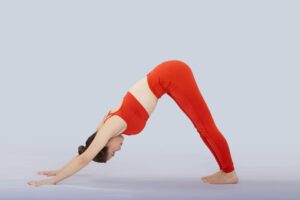Yoga encompasses a blend of ancient practices originating from India, designed to harmonize the body, mind, and spirit. Its goal is to cultivate mastery over the mind, acknowledging a serene observer consciousness beyond mental fluctuations and worldly distress.
Numerous misconceptions surround around the practice of yoga, on social media, yogis often showcase acrobatics and extreme flexibility, yet authentic yoga transcends these displays. From a physical standpoint, yoga emphasizes mindful movement, directing attention to the rhythm of breath within different postures. It fosters a mindset of presence and self-compassion, prioritizing the process over the outcome.
Philosophically, yoga traces back over 2,000 years, entails more than just poses. It encircles an eight-limbed path, integrating ethics, breathwork, and meditation into a holistic practice.
Engaging in yoga practice can offer a plethora of advantages for both physical and mental well-being.
Within the realm of Yoga various styles exists, with Hatha being among the most widely practices. Unlike more meditative forms, Hatha yoga leans towards physicality, It emphasizes controlled breathing exercises called pranayama followed by a sequence of yoga postures known as asanas, culminating in savasana, a period of relaxation.
The aim during yoga is to push your physical limits without becoming overwhelmed. At this threshold, attention shifts to the breath, fostering a serene and accepting state of mind
The term “yoga” originates from the Sanskrit root “yuj,” translating to “to yoke” or “to unite.” Its interpretations range widely, encompassing astrological alignments, marital union, and more, all echoing the essence of connection.
Benefits of Yoga
Helps in Weight Management:
Individuals who incorporate yoga into their lifestyle and practice mindful eating tend to have heightened awareness of their bodies, they may be more attuned to hunger signals and sensations of satiety.
Studies reveal that yoga practitioners exhibit lower body mass indexes in contrast to non-practitioner. Researchers attribute these outcomes to mindfulness. Adopting mindful eating habits foster a healthier and more harmonious relationship with food and eating behaviors. For more info on weight loss read previous article. https://healthgoalsforall.com/preconceived-notions-about-weight-loss/

Yoga Role in Mental Well-Being:
Many people seek out complementary therapies like yoga to alleviate mental health challenges such as depression, anxiety, stress, and insomnia. Engaging in yoga encourages individuals to unwind, control their breath, and focus on the present. These shifts help rebalance the body’s response from the fight or flight mode of the sympathetic nervous system to the relaxation mode of the parasympathetic system.
This relaxation response promotes a feeling of tranquility and rejuvenation by slowing breathing and heart rate, reducing blood pressure, decreasing cortisol levels, and improving blood flow to essential organs and the digestive system. Sourced from NIH (https://www.ncbi.nlm.nih.gov/pmc/articles/PMC3193654/). Read previous article on Mental Health Well Being, https://healthgoalsforall.com/mental-health-awareness/

Helps in Enhancing Cardiovascular Health:
Several small studies have found yoga to have a positive effect on cardiovascular risk factors it helped lower blood pressure in people who have hypertension. Its likely that the yoga restores, “baroreceptor sensitivity”, This helps the body senses imbalances in blood pressure and maintain balance.
Another study found that practicing yoga improved lipid profiles in healthy patients as well as in patients with known coronary artery disease. IT also lowered excessive blood sugar levels in people with non-insulin dependent diabetes and reduces the need for medications. Yoga is now being included in many cardiac rehabilitation programs due to its cardiovascular and stress relieving benefits. Sources from, “” Harvard Health Publishing”,(https://www.health.harvard.edu/staying-healthy/yoga-benefits-beyond-the-mat)

Yoga Enhance Flexibility:
Enhanced flexibility stands out as one of the initial and most noticeable advantages of yoga. Through consistent practice, there’s a gradual relaxation of muscles and connective tissues around the bones and joints, contributing to decreased discomfort and soreness. Moreover, yoga aids in the development or preservation of muscle strength, which serves as a safeguard against conditions like arthritis, osteoporosis and back pain
Yoga Enhances Blood Flow:
Yoga promotes increased blood circulation and boosts levels of hemoglobin and red blood cells, facilitating greater oxygen delivery to body cells, thereby enhancing their functionality. Additionally, yoga has a blood-thinning effect, reducing the likelihood of heart attacks and strokes often caused by blood clotting. Poses involving twisting actions help expel venous blood from internal organs, allowing oxygenated blood to replenish them upon release. Furthermore, inverted poses facilitate the flow of venous blood from the lower body back to the heart and lungs, where it undergoes oxygenation. Numerous studies indicate that yoga reduces resting heart rates, enhances endurance, and improves the body’s ability to uptake and utilize oxygen during physical activity. Maintaining a consistently elevated heart rate within the aerobic range through yoga lowers the risk of heart attacks. Sourced from NIH (https://www.ncbi.nlm.nih.gov/pmc/articles/PMC3193654/).

In conclusion, yoga stands as a multifaceted practice that extends far beyond physical exercise. Its profound effects on the mind, body, and spirit make it a versatile tool for promoting holistic well-being. From enhancing flexibility and strength to fostering mental clarity and emotional balance, yoga offers a pathway to greater harmony and vitality. Whether seeking relief from stress, improving cardiovascular health, or deepening self-awareness, the transformative power of yoga is accessible to all who embark on the journey of practice. Embrace yoga as not just a form of movement, but as a lifestyle that nourishes the entirety of one’s being, uniting body, mind, and soul in a journey towards holistic wellness.








